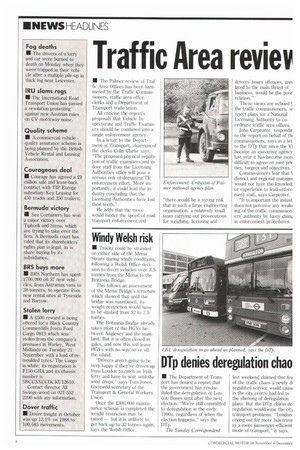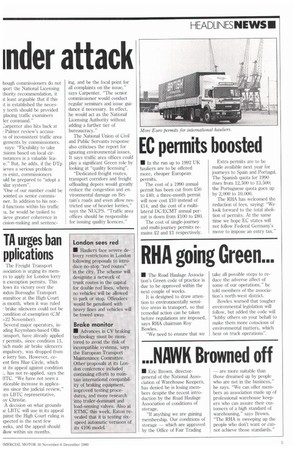Traffic Area reviev inder attack
Page 6

Page 7

If you've noticed an error in this article please click here to report it so we can fix it.
• The Palmer review of Traffic Area Offices has been hammered by the Traffic Commissioners, traffic area office clerks and a Department of Transport trade union.
All criticise the report's proposals that Vehicle Inspectorate and Traffic Examiners should be combined into a single enforcement agency.
In a letter to the Department of Transport, chairman of the clerks Colin Clarke says: "The proposed physical separation of traffic examiners and indoor staff from the Licensing Authorities office will pose a serious risk of disrupting TE enforcement effort. More importantly, it could lead the industry concluding that the Licensing Authorities have lost their teeth."
He adds that the move would hinder the speed of road transport enforcement and "there would be a strong risk that in such a large engineering organisation, a relatively small team carrying out prosecutions for weighing, licensing and drivers' hours offences, unn lated to the main thrust of business, would be the poor relation."
These views are echoed 1 the traffic commissioners, w reject plans for a National Licensing Authority to coordinate traffic area offices.
John Carpenter, respondir to the report on behalf of thi commissioners, says in a let to the DTp that since the VI became an executive agency last year it has become mon difficult to agree on joint pric ties, targets and objectives.
Commissioners fear that \ district and regional managei would not have the knowledi or experience to lead enforc, ment staff, says Carpenter.
"It is important the indust does not perceive any wealu ing of the traffic commission ers' authority by hasty charu in enforcement procedures. hough commissioners do not port the National Licensing thority recommendation, it it least arguable that if this ;t is established the necesy teeth should be provided placing traffic examiners ler command."
:arpenter also hits back at Palmer review's accusaas of inconsistent traffic area gements by commissioners. says: "Flexibility to take cisions based on local cirnstances is a valuable feat." But, he adds, if the DTp ieves a. serious problem as exist, commissioners iold be prepared to "adopt a ilar system".
''One of our number could be )(Anted as senior commisner. In addition to his norii functions functions within his traffic aa, he would be tasked to iieve greater coherence in cision-making and sentenc
ing, and be the focal point for all complaints on the issue," says Carpenter. "The senior commissioner would conduct regular seminars and issue guidance if necessary. In effect, he would act as the National Licensing Authority without adding a further tier of bureaucracy."
The National Union of Civil and Public Servants response also criticises the report for ignoring environmental issues. It says traffic area offices could play a significant Green role by looking at "quality licensing".
"Dedicated freight routes, transport corridors and freight offloading depots would greatly reduce the congestion and environmental damage on Britain's roads and even allow restricted use of heavier lorries," says the NUCPS. "Traffic area offices should be responsible for issuing quality licences."
















































































































